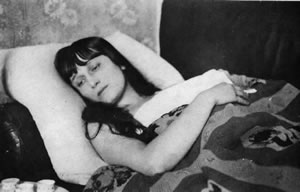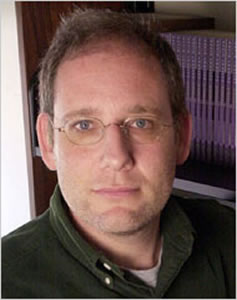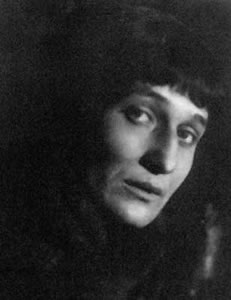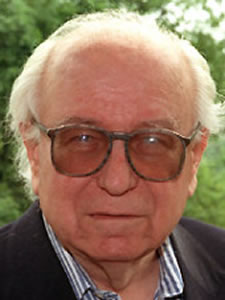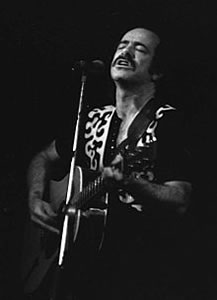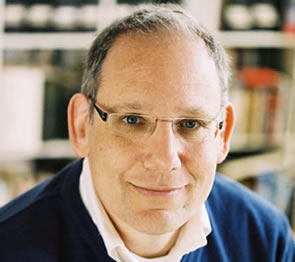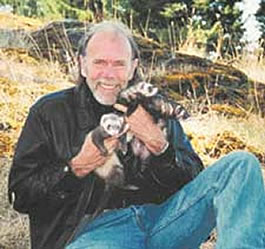De Amerikaanse schrijver Richard Bach werd geboren in Oak Park, Illinois op 23 juni 1936. Zie ook alle tags voor Richard Bach op dit blog.
Uit: The Bridge Across Forever
“Dearest Richard,
It’s so difficult to know how and where to begin. I’ve been thinking long and hard through many ideas trying to find a way. . .
I finally struck one little thought, a musical metaphor, through which I have been able to think clearly and find understanding, if not satisfaction, and I want to share it with you. So please bear with me while we have yet another music lesson.
The most commonly used form for large classical works is sonata form. It is the basis of almost all symphonies and concertos. It consists of three main sections: the exposition or opening, in which little ideas, themes, bits and pieces are set forth and introduced to each other; the development, in which these tiny ideas and motifs are explored to their fullest, expanded, often go from major (happy) to minor (unhappy) and back again, and are developed and woven together in greater complexity until at last there is: the recapitulation, in which there is a restatement, a glorious expression of the full, rich maturity to which the tiny ideas have grown through the development process.
How does this apply to us, you may ask, if you haven’t already guessed.
I see us stuck in a never-ending opening. At first, it was the real thing, and sheer delight. It is the part of a relationship in which you are at your best: fun, charming, excited, exciting, interesting, interested. It is a time when you’re most comfortable and most lovable because you do not feel the need to mobilize your defences, so your partner gets to cuddle a warm human being instead of a giant cactus. It is a time of delight for both, and it’s no wonder you like openings so much you strive to make your life a series of them.
But beginnings cannot be prolonged endlessly; they cannot simply state and restate and restate themselves. They must move on and develop—or die of boredom. Not so, you say. You must get away, have changes, other people, other places so you can come back to a relationship as if it were new, and have constant new beginnings.”

Richard Bach (Oak Park, 23 juni 1936)
Cover
De Duitse dichteres Cornelia Schmerle werd geboren op 23 juni 1973 in Berlijn. Zie ook alle tags voor Cornelia Schmerle op dit blog.
Mono, perspektiv
Der Diskurs ist nicht.
Du hast den Diskurs nicht eingeplant; das Fahrtenbuch
auf den Knien, die Zigarre ansteckbereit
zwischen lesenden Fingern – doch
der Diskurs rechnet sich selbst ein, sagst du.
(Wie könnte er?)
Von Zwangsläufigkeit ist die Rede, von der ich
nichts verstehe, nur
die Wolken seh, die aufziehn, sich
übern Kranich schlieren.
Welpe
diese puppe trägt einen namen –
bis gänzlich über die unbeschriebene stirn. schon
kriecht er ins weichplastik oder läuft aus
den sinnen. läuft nach: voraus. sicher aus
der stativen plastik; raunend in die gebärde.

Cornelia Schmerle (Berlijn, 23 juni 1973)
De Duitse schrijver en essayist Wolfgang Arthur Reinhold Koeppen (eig. Köppen) werd geboren op 23 juni 1906 in Greifswald. Zie ook alle tags voor Wolfgang Koeppen op dit blog.
Uit: Amerikafahrt und andere Reisen in die Neue Welt
„In Paris auf dem Bahnhof St. Lazare, dicht bei Balzacs alter Rue d’Amsterdam, blühte Frankreich, spannte sich von Pfeiler zu Pfeiler das Netz der Hirngespinste, faulte Geschichte. Die lange, wie von milchig zerfließendem Absinth überglaste Passage war neunzehntes Jahrhundert, sie verkörperte eine große französische Epoche, sie war lächerlich und bewundernswert, sie war anrüchig und verführerisch.
Das kleine helle Irrlicht der Aufklärung und die rührende bunte Wunderlampe der Literatur leuchteten. Sie leuchteten immer noch. Ich fragte mich, wie lange noch? Das Blut der Gloire und der Freiheit hatte den Boden gedüngt, das Blut war von Schicht zu Schicht gesickert. Der Duft des Huhn-im-Topf lag in der Luft, wie der Wolfshauch des Hungers, der Atem der Erhebung, der Mief der Malaise, das schalgewordene Parfüm der Skandale und der saure Geruch der Macht, die seit Jahrhunderten um die Bastille wehen. Ich fühlte mich hier zu Hause. Ich hatte gelesen, daß nur wer im achtzehnten Jahrhundert in Frankreich gelebt habe, die Lust des Daseins kenne; dennoch liebte man in Paris die Revolution, den nie endenden Sturm auf alle Zwingburgen, die Geister des Aufstandes waren von altersher zum Bankett geladen, man wünschte die Unruhe, hier war ich Europäer, und ich wollte es bleiben. Einer Maus wurde eine Schale Milch hingestellt, eine Katze sah der Maus begehrlich und träge zu. Algerien und die Folter waren fern und nah. An den Zeitungsständen war das Wort des Gewissens affichiert, Sartre und Mauriac riefen Zolas »J’accuse«, und der General sang vor hundert Kamera-augen die Marseillaise. Vor einem Bistro luden wacklige Stühle zu gemütlichem Verweilen ein. Man schenkte den herben Weißwein aus, den nach Georges Simenon die Kommissare der französischen Kriminalpolizei lieben, was ihnen einen menschlichen Zug verleiht, der am Quai des Orfevres enttäuscht. Frauen, für Umarmungen geboren, eilten mit ernstem Berufsgesicht zur Arbeit. Auf einem Leuchtbild warb eine üppige Blondine aus dem Samen Renoirs und als Matrose gekleidet für ein schäumendes Bier.“

Wolfgang Koeppen (23 juni 1906 – 15 maart 1996)
Cover
De Zwitserse schrijver, kunstenaar en socioloog Urs Jaeggi werd geboren op 23 juni 1931 in Solothurn. Zie ook alle tags voor Urs Jeaggi op dit blog.
Uit: Kunst
“Die Provinz kennen wir. Teils kommen wir von dort, haben sie ertragen, gehasst, geliebt und verflucht, teils trieb uns der Brotberuf in die Inseln der Langeweile und der Enge, die als Gefängnisse wirken. Es sind aber auch die Orte, wo wir unsere Körper entdeckt haben, und die Fremden, den Anderen, die Andere. Und wo ein Septembernachmittag mit seiner melancholisch milden Sonne etwas von dem vermittelt hat, was wir anspruchsvoll, aber uns angemessen scheinend das »Erhabene« oder das »Transzendente« nannten, das Intensivere als alles übrige. Sehen, riechen, spüren, fühlen. Hier lernten wir mit der Nase umzugehen und mit dem Kopf, hier lernten wir mit den Händen und Füssen uns zu wehren. Hier hörten wir zum ersten Mal Töne und Tonfolgen, die uns weghoben, zerfetzten und wieder zusammenfügten, die uns tanzen liessen. Be high. Be hot. Be in the groove, ohne speed, nur mit schwarzer Musik.
Tougher than the rest. In der Provinz ist das für die, die es wissen möchten, intellektuelle und künstlerische ‘Pflicht’.
In der Pheripherie heisst das: Überleben, Kampf (Kampf bis aufs Messer, wenn es so ist und anders nicht geht). Peripherien sind gemessen an der deftigeren, sinnlicheren Provinz abstrakter, flüchtiger, maroder und moderner, zukunftseuphorischer und apokaliptischer. Es sind glitschige, abschüssige, hochbrisante und langweilige Terrains, Orte des extrem Gewaltätigen, Exzessiven, Kriminellen, aber auch der flüchtigen Zärtlichkeit und Poesie; Explosives, Resignatives und, ja, es sind auch Orte der Liebe und des bizarr Schönen.“

Urs Jaeggi (Solothurn, 23 juni 1931)
De Amerikaanse dichter, vertaler en tekstschrijver Robert C. Hunter werd geboren op 23 juni 1941 in San Luis Obispo, California. Zie ook alle tags voor Robert C. Hunterop dit blog.
Love in the afternoon
Love – Love in the afternoon
Outside the window
an organ grinder’s tune
Rhythm, wine
A touch of Jamaica
Twilight time with a Kingston lady
All the time in the world
for me and that girl
Sweet – She sang sweetly
Come back soon
Come back for more of that love
in the afternoon
Breezes blow by me
in the afternoon
She sings sweetly
an organ grinder’s tune
Finally recovered from last years round
of bye bye baby blues
All I crave today
Some love in the afternoon
Love – Love in the afternoon
It’s easy as she goes
like an organ grinder’s tune
Gone with the moon
any old trouble
can’t leave too soon
Trouble’s no part of what I want
especially in the afternoon
Singing
Sleeping till two
Waking to make more
love in the afternoon

Robert C. Hunter (San Luis Obispo, 23 juni 1941)
Onafhankelijk van geboortedata
De Nederlandse dichteres Hanneke van Eijken werd geboren in 1981 in Amersfoort. Zie ook alle tags voor Hanneke van Eijken op dit blog.
Op de rug van een stier
Iemand zei dat Europa niets meer is
dan een grillige vlek op een wereldkaart
zonder te beseffen
dat goden van alle tijden zijn
dat Europa vele vormen kent
ze is een eiland in de Indische Oceaan
een maan bij Jupiter
zevenentwintig landen die als koorddansers
in evenwicht proberen te blijven
er leven godenkinderen die vergeten zijn
wie hun vader is
Europa is een vrouw
met een kast vol jurken
ze houdt er niet van een vlek genoemd te worden
over de wraak van goden en vrouwen met jurken
kun je beter niet lichtzinnig doen

Hanneke van Eijken (Amersfoort, 1981)
De Amerikaanse dichter Will Shutt werd geboren in 1981 in New York. Zie ook alle tags voor Will Shutt op dit blog.
American Window Dressing
Half a dozen pestamals hanging on hooks,
a cuckoo clock twigged from scrap metal,
a single copy of Everyman’s Haiku-
the letters pit the cover’s look-at-me
moon sheen-and the poems I love
inside: spartan, semitransparent, nature’s fools,
like faraway countries in full disclosure.
“Put everything into it.” My father’s
words on Sunday visits. Man of few words.
Those were the days work took him
as far as Chungking and he sported
a straight green army coat he called
his Mao Suit. His hair was still parted
straight to one side and he could
still lift me up so that I stood eyelevel
with row after row of ducks, like smokers’
lungs, in the restaurant windows
off Confucius Plaza-thick tar up top
swizzed into brown and rose gold.
A metal sling dug under their wings ended
in a hole the heads were put through.
Knowledge of them was terrible.
Everything looked terrible: the heads
of bok choy noosed in rubber bands
and pale-eyed fish laid out on ice. Terrible
things put delicately, like polite fictions
families invent. The words stand behind
great portals and are seen to yet untouchable.

Will Shutt (New York, 1981)











